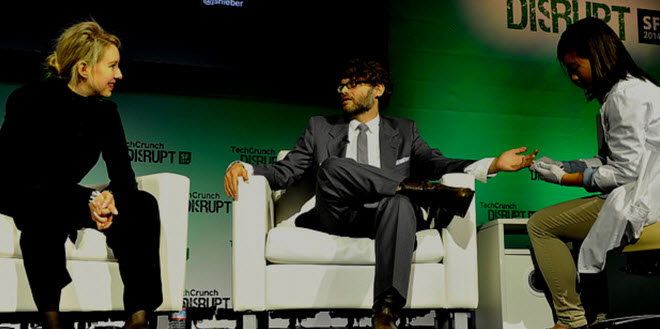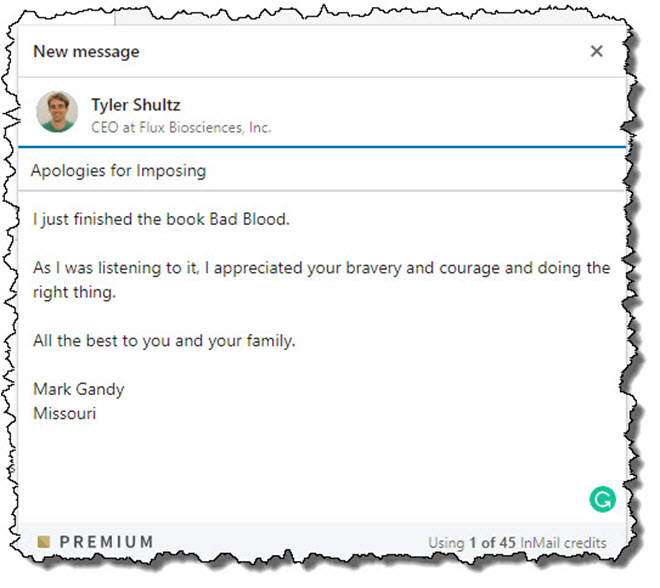What is there left to say about this hard-to-put-down book? Nearly every blog publisher listing their top nonfiction books for 2018 includes John Carreyrou’s best-seller Bad Blood.
Theranos Overview
I’m still amazed by the subject matter and the key person behind the story of a failed Silicon Valley startup. Wall Street Journal author John Carreyrou chronicles the beginning and the end of Theranos founded by Elizabeth Holmes. Parts of it read like a fictional thriller.
Elizabeth Holmes founded the company after dropping out of Standford University at the age of 19. Holmes stated she created the company due to her intense fear of needles.
Theranos was created to manufacture a simple blood test without the need for intimidating, invasive needles. However, the company was never able to create such a product that worked, and that led to false claims by the founder in order to keep investment funds flowing to Theranos.

Why Did the Founder Deceive So Many?
Certain leaders of Theranos became bullies of disenchanted employees who left the firm because they knew the product was faulty. That’s what I found jarring in this story.
One of the heroes in this book is the grandson of former U.S. Secretary of State, George Schultz. Tyler Schultz quit his lab position at Theranos after 8 months on the job because he could not overlook the ethical flaws of his employer. Tyler was then intimidated multiple times by the Theranos law firm, and his speaking to the press ultimately resulted in the estrangement from his grandfather who was on their Board of Directors.
I still believe at one time Holmes had pure motives when she started Theranos. Carreyrou’s final words sum up my thoughts about this startup founder.
I’m fairly certain she didn’t initially set out to defraud investors and put patients in harm’s way when she dropped out of Stanford fifteen years ago. By all accounts, she had a vision that she genuinely believed in and threw herself into realizing.
Carreyrou, John. Bad Blood: Secrets and Lies in a Silicon Valley Startup (p. 341). Knopf Doubleday Publishing Group. Kindle Edition.
I Recommend Bad Blood
I do not recall this story at all as it unfolded. I happened upon the title during some weekly surfing on both Amazon and Audible.
As I started listening to the book, I had a difficult time in wanting to shut it off. The book is absorbing and you’ll find yourself getting angry with certain characters in the book including Holmes.
I feel for any customers who used the Theranos testing process that provided inaccurate results. I feel for employees who were bullied and intimidated when they elected to leave the company for the right reasons. I even feel for the author who had to put up with Holmes and her legal team trying to discredit the writer before and after publishing his first account about the legitimacy of the Theranos blood testing technology.
After finishing the book, I thanked the author on Twitter. Next, I sent a note of encouragement to Tyler Schultz through LinkedIn. As of this writing, he had not responded, nor do I expect him to do so.
 What Are the Takeaways?
What Are the Takeaways?
After I finished this book, I was numb. Now what? Or, what can we learn from this story of deception and crime?
For starters, corporate governance was a joke. Where were the experts (even though Carreyrou answers this question fully)? Board members need to be experts and can’t just show up to quarterly meetings to be a rubber stamp for management. Would that have made a difference at Theranos? We’ll never know and can only speculate.
Additionally, I fully support laws making it easy or easier to protect whistleblowers. If you disagree, spend some time reading the stories of Sherron Watson (Enron) and Cynthia Cooper (WorldCom).
Are you an investor? Be skeptical. Just because the founder has been successful at raising money doesn’t guarantee business success. Common sense, right? Ask the investors who lost millions of dollars in this startup. Ask Walgreens too. Revisit your due diligence procedures on all future investments.
Finally, never underestimate the potentially destructive nature of human nature. I believe Elizabeth Holmes had noble and lofty ambitions to help others before she launched Theranos. Carreyrou believes this too.
But his reporting is clear on the person she became. With stories like this, every CEO should revisit his/her company’s core values and determine if those documents are just shallow words or shared values embraced by every employee throughout the company.

Leave a Reply